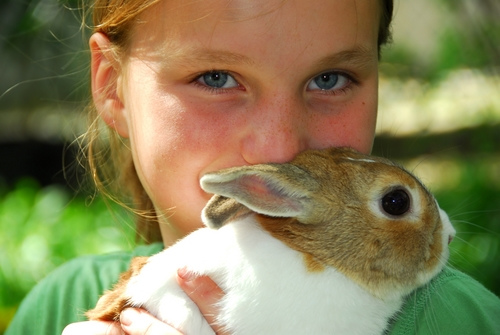
[social_buttons]
According to a University of Southampton study published by the British Medical Journal, children with high IQs become vegetarian adults. Dr Catharine Gale of the University’s MRC Epidemiology Resource Centre who led the study explains:
Those who were vegetarian by the age of 30 had scored five IQ points above average at the age of ten. This can be partly accounted for by better education and higher occupational social class, but it remained statistically significant after adjusting for these factors…
One explanation for the link between higher IQ and vegetarianism may be that brighter children grow up to think more about what they eat, which in some cases has led them to become vegetarians.
I’ve always thought vegetarians were smarter people, and the results of this study do not surprise me. Gifted and talented children often worry more than their peers about social issues, because they have a heightened sense of moral concern:
Smutny (1998, p.10) explains how gifted children feel deeply for others. “They sense the joys, pains, sorrows and hopes of family members, friends, classmates and sometimes become distressed when they cannot alleviate the problems of others……gifted children will often weep at the cruel treatment of an animal. They will frequently ask questions and express concern about world problems – poverty, war, environmental devastation”. This empathy for the suffering of others makes gifted children particularly vulnerable to the many forms of insensitivity they see on television, at school or in the world around them. Often these children feel powerless to act and this sense of helplessness can lead them to despair and guilt as they feel a responsibility for these situations.
Choosing a vegetarian lifestyle is one way to alleviate this sense of helplessness.
Vegetarian adults were not only smart youths, but they are more likely to be female, more educated, and occupy a higher social class.
The only non-vegetarian researcher in the study felt the link between childhood intelligence and vegetarianism is not necessarily causal, but “might be one of a number of more or less arbitrary cultural choices that clever people make, some of which might be beneficial to health, and some not.” My choice to become a vegetarian at the age of sixteen was certainly not arbitrary.
I decided to be vegetarian as a young adult, but it was difficult because I am married to a farm raised meat and potato man with no interest in being vegetarian. When we had our first daughter we briefly discussed raising her as a vegetarian, but she adored sitting on her dad’s lap and eating with him. Thus, she naturally grabbed meat off his plate. Over eight years and one more daughter later, the whole family eats meat, but we do our best to either buy organic or from a local farmer.
This New Year’s eve, my 8 year old made an unexpected resolution to become a vegetarian. (We had never spoken of it before). She said she always thinks about the animals that the meat comes from and she likes animals, so she wonders why she eats them. I am more than happy to support her decision and we ran out and got some great vegetarian cook books. Luckily, she already loves many types of beans and veggies, so I know her diet will be healthy. I am immediately happy being back to a vegetarian diet (and my 5 year old has now expressed interest, too).
It was interesting to read about the correlation to IQ. Not to toot my own horn too loudly, but I have always exceeded at academics and in high school I was in the gifted program and graduated with honors. My daughter has always been precocious, too, and is already in her elementary school’s gifted program and is at the top of her class.
The gender bias is certainly intriguing, as well. Thanks for sharing this study!
This doesn’t surprise me at all; entirely expected. It also signals greater personal restraint, responsibility and sacrifice. In my case, it wasn’t in compassion for animals altho I love them and have been involved in animal rescue etc. It was because becoming a vegetarian has greater impact on reducing the ecological load on the planet, more than going off the grid, driving a hybrid, recycling or any other myriad of options, COMBINED. Amid the increasing clamor of eco adherents, becoming a vegetarian is the trump card. Most people want to SPEND their way into sustainability but true sustainability means sacrifice.
I suspect that there’s a correlation between “flexitarianism” and high IQ as well for many of the same reasons mentioned. Many bright individuals I know who do eat meat have made a conscious decision to base their meals around plant-based foods and “use meat as a condiment” as the saying goes.
This make a lot of sense. I think it has a lot to do with how you a raised, your up bringing.
WOW if you read the real report it states that there were NO differences between strict vegetarians and their meat eating counterparts. (they forgot that chicken and fish were meat)
Sometimes it seems cool to become vegetarian,especially since it feels more refreshing,but it’s like having to tell your parents that you’re pregnant or something,even as an adult,you just feel that you’ll let them down,and they won’t love you as much.